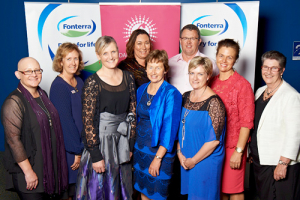Fonterra’s $3.2b capital return to farmers set to boost rural incomes and NZ economy
According to ASB, Fonterra's plan to sell it's Anchor and Mainlands brands could inject $4.5 billion in additional spending into the economy.
 Dairy Women’s Network Board of Trustees, from left: Pamela Storey, Donna Smit, Justine Kidd, Zelda de Villiers, Chris Stevens, Mark Heer, Alison Ferris, Tracy Brown and Alison Gibb.
Dairy Women’s Network Board of Trustees, from left: Pamela Storey, Donna Smit, Justine Kidd, Zelda de Villiers, Chris Stevens, Mark Heer, Alison Ferris, Tracy Brown and Alison Gibb.
Dairy Women’s Network is urging voters to support rural women to represent them as election season hits.
Now is the time to ensure a diverse rural voice is heard around the board table with local government, farmer cooperatives and regional councils being selected, says DWN chief executive Zelda de Villiers.
“New Zealand needs a rural voice on many of these boards as issues outside the farm gate are increasingly impacting the way farmers do business,” she says.
Dairy Women’s Network trustee and ASB Rural general manager Mark Heer says diversity and capability of its members are the two key qualities that make an effective board.
“We know that diversity increases the performance of an organisation. Not only gender diversity - but also age, cultural, experience and urban/rural diversity,” says Heer.
“Diversity of thinking leads to a better decision making process. It allows you to highlight risks and opportunities that you may not see with group thinking, which leads to a better performance overall.
He says not enough women stand for election and when they do, not enough are selected, leaving an untapped talent pool in the community.
“Add all this to the fact that 80% of the world’s purchases are made by women. There is a need to get closer to the consumer, which is a good reason that a better gender mix at the board table is needed.”
The Human Rights’ Commission’s 2012 NZ Census of Women’s Participation report shows just 14.6% of primary industry boards include women. That figure is just 17%t for the NZX, while 42% of the state sector’s boards comprise female members.
“At DWN, we take leadership development of our members seriously and one way we do that is by providing women with the opportunity to develop their leadership skills by ‘doing,’” says de Villiers.
“The Network provides women with different opportunities to utilise and develop their skills by volunteering as regional leaders, being part of the conference committee or as a paid project leader or presenter of our dairy modules.
“When women have the courage to put up their hands for these opportunities, we are not only stunned by the skills they bring to the table, we are always impressed by the development and growth we witness -- often over very short periods of time.”
Dairy Women’s Network trustee Cathy Brown agrees: “I am often surrounded by extremely capable women in the dairy industry which I take for granted until I sit around other board tables and realise the calibre of skills that the women of the dairy industry have and how transferrable those skills are.”
With the current situation in the European farm machinery market being described as difficult at best, it’s perhaps no surprise that the upcoming AgriSIMA 2026 agricultural machinery exhibition, scheduled for February 2026 at Paris-Nord Villepinte, has been cancelled.
The Meat Industry Association of New Zealand (MIA) has launched the first in-market activation of the refreshed Taste Pure Nature country-of-origin brand with an exclusive pop-up restaurant experience in Shanghai.
Jayna Wadsworth, daughter of the late New Zealand wicketkeeper Ken Wadsworth, has launched an auction of cricket memorabilia to raise funds for I Am Hope's youth mental health work.
As we move into the 2025/26 growing season, the Tractor and Machinery Association (TAMA) reports that the third quarter results for the year to date is showing that the stagnated tractor market of the last 18 months is showing signs of recovery.
DairyNZ chair Tracy Brown is urging dairy farmers to participate in the 2026 Levy vote, to be held early next year.
Beef + Lamb New Zealand (B+LNZ) is calling for nominations for director roles in the Eastern North Island and Southern South Island electoral districts.